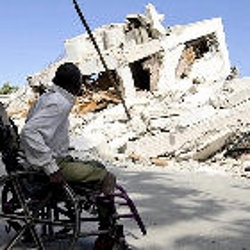Science for Haiti
| Topics: |
Geology (main)
|
Eva Aguilar reports 20 September 2011 on SciDev.Net
Haiti's road to recovery lies with science, says AAAS
en Español
Haiti could follow the example of other developing countries, such as Rwanda, and bolster its science capacity to help the country recover from last year's devastating earthquake, according to a report by the American Association for the Advancement of Science (AAAS).
'Science for Haiti' presents a set of strategic goals — and recommendations for realising them — to boost science capacity and education in the Caribbean country. It urges Haitian scientists, the international science community, donor and aid organisations to work together to achieve these goals.
The report is a "roadmap for progress", according to the authors, who presented the document at a meeting with representatives of Haiti's science community, education and private sectors in the capital city Port-au-Prince this week (19–20 September).
The aim is to advance Haiti's capacity in areas that support its sustainable development and prosperity, and the sustainability of its natural resources.
The authors recommend, among other things, establishing a national policy to boost science capacity; strengthening the relationship between the Haitian scientific community and the private sector; and increasing Haitian scientists' access to international scientific journals and electronic databases.
The report was developed with the collaboration of scientists and educators from Canada, Haiti, Puerto Rico, Rwanda and the United States, who attended three workshops held in Haiti and Puerto Rico last year.
Participants at one of the workshops heard about the case of Rwanda, which put science, technology and innovation at the centre of its strategy for development and economic recovery after the genocide of 1994.
"Rwanda shows that a strong national policy and advancing science education for children pays off in terms of prosperity, future for the nation and actually contributes to civil order," Gary Machlis, professor of conservation at the University of Idaho, United States, and one of the authors of the report, told SciDev.Net.
The capacity of Rwanda's scientific policy to operate at all levels of social organisation "in the national capital and in small villages at the same time" is key "to successfully transform development", said Machlis.
Galileo Violini, professor of physics at the University of Calabria, Italy, and a delegate of the rector of the academic institution for international relations, said that the AAAS report is a good guide with "excellent ideas and sensible recommendations", but that he did not agree that lessons from Rwanda can easily transfer to Haiti.
"The problems in Haiti are complex. There is a high level of illiteracy and immediate needs in health and in rebuilding physical infrastructure," said Violini, who also works for the International Center of Theoretical Physics as an advisor for Latin America and the Middle East.
Fritz Deshommes, vice rector of research at the State University of Haiti, welcomes the report and praises the principle highlighted by the authors that Haitian people are in charge of their own future. "It is for them to decide their scientific goals," he said.
Link to full report 1.31MB
